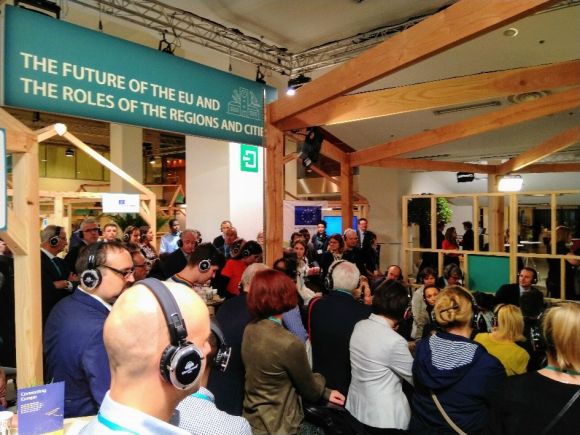
Global climate change is something I think about every day. Not a single day goes without a feeling of anxiety about the future. Almost everyday, headlines are screaming about climate change, or a friend tells me a personal experience about it. The experiences can be about the rain which never comes, or the floods, which are becoming worse, or a stormier sea. And these are the headlines and experiences that young citizens must grow up with nowadays.
To ease my personal anxiety I'm doing something concrete, that EU’s cohesion policy enables me to do: I'm working in a cross-border Interreg project.
During EU Regions week, I had the opportunity to hear about other Interreg projects fighting against climate change. I instantly related to them: our common factor is enthusiasm towards what we're doing and the feeling that I can contribute. Though we are not on the winning side, we want to be optimistic.
But why it is important to tackle climate change now? Through cohesion policy, regional disparities have decreased in all over Europe. However, climate change can and will slow the progress and even reset the achieved results.
It is no wonder, why young citizens from all over Europe want to make a difference. And they have every right to stand on the barricades. Nobody has missed the voice risen from these young citizens, who are not lacking courage. They have managed to pound the pavement and their opinion grows more and more every day.
According to my own experience, Interreg projects actively involve citizens through communication. However, sometimes a project can fail in communication. And that's why some of the results that cohesion policy produces might be too intangible. It is crucial that those projects are brought to citizens and the EU should do more to awake the awareness that something is done.
Interreg projects not only involve citizens, but our aim is to produce concrete tools for decision-makers as well. I work in an Interreg Botnia-Atlantica project in which we're studying the impacts of climate change on underwater marine nature. The results can be put into practice in marine spatial planning or in marine protected area network planning.
The best thing about our project is that the results will be publicly available and reached by citizens, and everybody can understand them, not only experts. The results will directly indicate what kind of impact climate change will have on inhabitants’ everyday life in our region.
With this article, I want to represent my tribute to the Interreg programme. Interreg projects are not limited by borders, but create a platform enabling countries to work side by side. I think that it is the key for a brighter future.
Aija Nieminen, project worker, Interreg Botnia-Atlantica (Finland)



